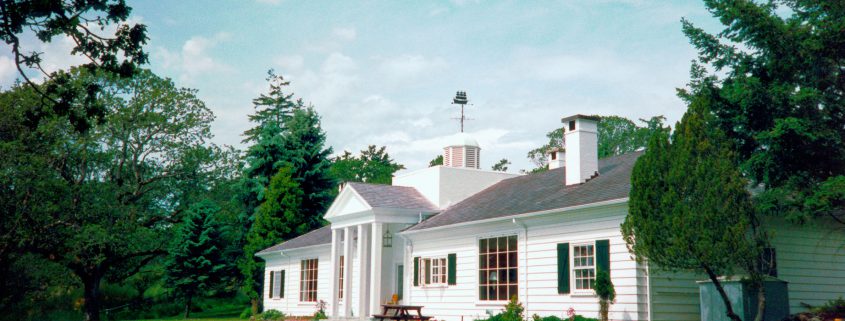Swanwick Star Issue No. 7 (2014)
A Krishnamurti Weekend Retreat
Recently I had the pleasure of attending a retreat at the Krishnamurti Centre in Metchosin, British Columbia. The centre itself is located on a majestic estate which was a Krishnamurti school from 1977 to 1981, and is currently being used for a variety of spiritual retreats and gatherings. It was certainly refreshing to relax in such a beautiful setting, the property itself flowing down to the ocean and surrounded by the serenity and majesty of the Canadian west coast, but the content of the retreat itself was especially refreshing. In fact, while the word “enlightened” gets thrown around quite a bit these days, I can say with sincerity that I left the retreat a great deal more enlightened than when I had arrived two days earlier.
I’ve struggled since I was young with issues surrounding identity and purpose. This is something most people wrestle with at different times in their lives, and to varying degrees, but it was something that I could never reconcile enough to actually feel grounded in my own being. My father introduced me to Buddhism and mysticism when I was a teenager, and I’ve been exploring different philosophies and spiritual practises since then. Beneath that exploration though- and something that was far more pervasive than the outward seeking- was a constant underlying questioning that had permeated every corner of my psyche. “Who am I?”, “Why am I here?” and “What’s the point of all this?” were questions that were really tearing me apart inside. There’s nothing wrong with these questions in and of themselves, but if our sense of self is contingent on finding reasonable answers, than such questioning can easily become a slippery path to confusion, despair and existential crisis.
It was a combination of questioning and crisis that led me to pick up Eckhart Tolle’s The Power of Now last year. For the first time in my life I was reading something that was actually affecting a very real change in the way I related to my thoughts and the world around me, but it only took me so far at the time. While The Power of Now remains my favourite “spiritual” book to date, it ignited a process in my psyche but I would require further wisdom to help me take the next step. This year I started listening to Alan Watts lectures, which ultimately led me to the teachings of Jiddu Krishnamurti. I was quite surprised when my mother informed me that she had seen an advertisement for a Krishnamurti Centre right outside of Victoria, the city I’m grateful to call home.
The retreat itself was based on Krishnamurti’s teachings, and it was entitled The Nature of Relationship. It was led by Dr. Harshad Parekh, who was formerly a teacher at a number of Krishnamurti Schools in India, and someone whose life has been deeply impacted by Krishnamurti’s teachings. Dr. Parekh shared an excellent selection of videos and excerpts from books, elaborating and answering questions in ways that helped to clarify the teachings, which can sometimes seem quite esoteric. Ralph Tiller, who hosted the retreat, also provided valuable insight and helped to engage the conversation in meaningful ways.
The nature of relationship is truly at the core of Krishnamurti’s teachings, and so this retreat was not merely about “relationship” as many might presume. When most of us think of relationship, we tend to default to the realm of interpersonal relationships, such as those we have with our friends, family and coworkers. But the relationship Krishnamurti refers to is much more all-encompassing than that. In fact, he is referring to something that encompasses the totality of our experience.
We relate to the world by attaching meaning to our experiences, and by mentally labelling objects within the field of those experiences. In other words, we relate to the world through our thoughts. While thinking certainly serves its purposes, Krishnamurti asserts that our thinking has become a terrible barrier where our relationship to reality is concerned. Our thoughts are based on our past experiences, and in relating to the present by way of our thoughts we are relating to reality as a construct of the past, reducing it into a series of “likes and dislikes”. Instead of experiencing and engaging in life in a natural and dynamic way, our relationship to our experience is based purely on the images we have formed about ourselves, each other and the world. Krishnamurti explains how this incongruent relationship is at the root of suffering, at the heart of the conflict and dysfunction that has troubled humankind since time immemorial. He explains that society is simply an extension of the individual, and that as long as individuals continue to perceive reality by way of the past, then their actions will be out of step with reality and society will continue to be a destructive affair. This deep conflict manifests at every level of society, in such sad and tragic affairs as broken marriages, suicide, and war.
One of Krishnamurti’s most powerful and challenging assertions is that to correct these problems is not simply a matter of correcting negative or hateful thinking, but that the entirety of our normal process of thinking is at the root of all this suffering. And because the very basis for the way we think and relate is a product of social and cultural conditioning, the process of freeing ourselves from that conditioning is not a matter of using thought, because that simply limits the outcome to the realm of that conditioning and always essentially leads us right back to where we started. For that reason, the process of undoing this conditioning cannot directly involve any teaching, system, or tradition. The path to freedom is pathless, as Krishnamurti says, and involves embracing what he calls choiceless awareness. This is a state of consciousness that is free from judgement and condemnation, of likes and dislikes, and one that is not constantly defining experience- because every act of such definition is a distortion of the present into a construct of the past.
Now this may all seem like intellectual abstraction that has very little value in terms of real world application, but I believe that it is actually a deep understanding of human psychology and the roots of personal and social conflict. I’m just becoming acquainted with Krishnamurti, and even if my knowledge were greater, I certainly couldn’t explain the intricacies or implications of his teachings in such a space. Personally though, I have already started integrating his teachings into my awareness, and I can attest that they are indeed very powerful. I’ve become aware of how I’m constantly defining elements of my experience and how that causes a great deal of inner conflict for me. Practising “just watching” (as Dr. Parekh often says) as a means of nurturing choiceless awareness, I find my awareness is increasingly stepping in when I would otherwise be caught up in thinking, and that interruption can lead me to a place of true mental stillness. It’s a huge relief from the incessant mind that has been burdening me for so long.
Eckhart Tolle and Alan Watts paved the way for my understanding of Krishnamurti’s teachings, and my retreat at the Krishnamurti Centre seems to have ignited an ongoing process that continues to unfold on a daily basis. Just as I could only explain so much about Krishnamurti’s teachings, I have only explained just a bit about how these teachings are playing out in my daily life. I’m treating this as an ongoing experiment.
As for my big questions about life, thanks in large part to Tolle, Watts, and Krishnamurti, I’m developing an understanding of “self”, “other” and “society” that is helping me make sense of many things. I’m seeing more clearly just who I really am (by a process of understanding who I “really am not”), and also coming to understand some of the major underlying reasons for the suffering and chaos that have been humanity’s close companions for such a terribly long time.
Once we begin to shed those layers of self that are merely conceptual, it might seem like there is a great emptiness at the heart of all this, and at the core of our very being. In a sense, I think that’s correct. But I don’t believe this is a cold emptiness- quite the opposite in fact. I believe it’s something divine, and as we let go of the concepts that rule our perception, there is a real opportunity to enjoy a relationship with this underlying stillness that can enrich our lives in ways most of us can barely imagine, deepening our relationships and helping us to live our lives in ways that are truly serving both ourselves and others. This is a new path- a path to real freedom.
Julian Ruszel


